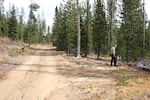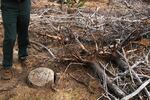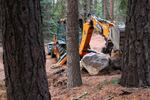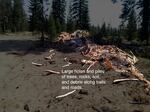
Snowmobile clubs used an excavator to uproot trees and push over trees.
Photo courtesy of Deschutes National Forest. Edited by OPB.
When Forest Service employees first stumbled upon the trail and road damage, they didn’t know who did it or why.
But they knew something was wrong.
Mile after mile of dirt trails and primitive roads west and south of Bend had been wrecked with heavy machinery. Trees were knocked over with roots attached. Culverts were smashed. Roads were widened to two or three times their original size. Some areas were stripped bare of vegetation and rocks. The debris was pushed into unkempt piles along the road.
The damage was so extensive that initially, forest trails supervisor Marv Lang suspected a rogue logging operation.
“But then I considered possible trail maintenance work by Snowbusters Snowmobile Club,” Lang wrote in a law enforcement report obtained by OPB through a public records request.
His instincts were well placed.
A Forest Service investigation revealed that the Central Oregon Snowbusters were one of two snowmobile clubs responsible for nearly $200,000 worth of damage to 31 miles of Deschutes National Forest roads and trails in the summer of 2014. The four-month investigation determined that the La Pine Lodgepole Dodgers also did some of the damage under the auspices of trail maintenance that explicitly benefited snowmobile users. The heavy equipment rental was funded by state gas tax dollars.
As Congress considers whether to give volunteers an expanded role in trail maintenance on national forests, the incident serves as a warning that such efforts can go awry without proper agency oversight.

District Ranger Kevin Larkin surveys trees that were knocked over and pushed to the side of the road by the snowmobile volunteers. The resulting wider road makes for an easier route for the club's groomers in the winter.
Amanda Peacher / OPB
Volunteers Without Oversight
So how did it come about that volunteers were able to operate heavy machinery on public lands for five weeks, unsupervised and unnoticed?
“This is one of those classic cases where simple miscommunication between two people led to completely different understandings of what was allowed,” said Kevin Larkin, district ranger for the Bend-Fort Rock Ranger District in the Deschutes National Forest.
The clubs had permission to perform light trail maintenance along snowmobile routes near the Cascade Lakes Highway and within the Newberry National Volcanic Monument. During a 2014 spring meeting, the volunteers told the Forest Service they wanted to increase maintenance that summer, Larkin said.
“From that very short conversation, the clubs believed that they had approval to go ahead with work,” Larkin said. “And the Forest Service believed that that work was going to be what we would consider routine maintenance…taking care of limbs and portions of trees that are extending into snowmobile trail corridors.”
“— Erik Fernandez, Oregon WildNo definition of trail maintenance includes smashing of culverts and knocking over trees.”
The agency provided the clubs with detailed permits outlining what volunteers could do. Nothing in their permits allowed volunteers to use heavy equipment to knock down trees, move rocks and soil, or widen roads.
Wally Buckman, the volunteer responsible for most of the damage, later told the Forest Service he did not read the entire permit. Assuming he had sufficient go-ahead, Buckman left a message with the Forest Service and then began working on the trails with a 30,000-pound John Deere excavator.
The rented equipment used by the clubs was paid for by the Oregon State Snowmobile Association with state tax dollars. The association has an annual contract with the Oregon Department of Transportation for up to $1.3 million. Part of that money comes from the fuel tax paid by snowmobilers. The snowmobile association channels those dollars to local clubs like the Snowbusters to pay for grooming and maintenance of 6,210 miles of trails statewide.

The forest service provided the clubs with detailed permits outlining what volunteers could do. Nothing in their permits allowed volunteers to use heavy equipment to knock down trees, move rocks and soil, or widen roads.
Deschutes National Forest
Over the course of five weeks, Buckman never heard from the agency, nor did he encounter Forest Service staff in the field.
Buckman declined to speak to OPB. But he told the Forest Service, “he thought he was doing good stuff,” according to the agency report.
Peggy Spieger, executive director of the snowmobile association, agreed.
“There was no intent to destroy the land or do something the Forest Service did not want to have done,” Spieger said. “The intent was to make a better trail.”
But for some environmentalists, that explanation falls short.
"No definition of trail maintenance includes smashing of culverts and knocking over trees," said Erik Fernandez, wilderness program manager for Oregon Wild. "They had a permit to be brushing, which is very light trail maintenance, and they ended up doing recreational bulldozing out there."
Cost For Rehabilitation
The Forest Service did not discover the damage until weeks later. Because of the extent of the damage, the agency launched a law enforcement investigation. Resource specialists spent weeks assessing the impacts and developing rehabilitation plans, costing the agency an estimated $40,000 in staff time on top of the $200,000 on-the-ground damage cost, according to Larkin. In the end, the Forest Service decided not to pursue criminal or civil charges against the snowmobile volunteers.

The Forest Service began work to repair erosion and other road damage in the fall of 2015. The total cost for rehabilitation is expected to come to $200,000. Here, a road crew moves boulders into place along one of the damaged roads.
Amanda Peacher / OPB
“What we realized is that there was not malicious intent,” Larkin said. “Everybody involved thought that they were doing the right thing for the right reasons and within the bounds of their authority.” He views the responsibility as shared between the clubs and his staff.
“— Peggy Spieger, Oregon State Snowmobile AssociationThe intent was to make a better trail.”
The final tab of $200,000 in damages is hefty, considering that the Deschutes National Forest has an annual maintenance budget of roughly $70,000 for trails and $400,000 for roads. Larkin expects rehabilitation work to be funded at least in part from those budgets. So far, Larkin has asked the statewide snowmobile association to contribute about $35,000 toward critical restoration costs.
Environmental groups like Oregon Wild don’t think it’s right for agency dollars to go toward fixing the damage.
“Those funds would otherwise have gone into improving hiking trails and mountain biking trails and campgrounds. Instead, it’s going toward cleaning up a mess,” Fernandez said.
Groups like Oregon Wild and Forest Service Employees for Environmental Ethics see the incident as symptomatic of a broader problem: Land agencies don't have adequate funding to manage recreation programs, including those that rely on volunteers.
“We’re not making the investments in our trails and recreation on the national forest that’s commensurate with the public use,” said Andy Stahl, executive director of Forest Service Employees for Environmental Ethics, a national watchdog organization. “Relying on volunteers, as well-intentioned as they are, doesn’t always yield good results.”
The consequences of this incident could be long-lasting. They could include road and trail erosion, soil displacement, potential introduction of invasive species and disturbance at archaeological sites.
The snowmobile groups, for their part, would like to quietly move past the incident.
“From our perspective, it’s not news-worthy. We did some resource damage, and we worked it out with the Forest Service to their satisfaction. We got our hands slapped and we’re all moving on,” Spieger said.
Congressional Action For More Public Lands Volunteers?

Bob Keller is the grooming chairman for the state snowmobile association. Where the Forest Service sees damage in the trees that were pushed over and the roads that were widened, he sees a better route for his groomers. "It’s like you and I, we can stand on the corner and watch an automobile have a wreck and we will both give a different story about the same thing we’ve both seen. We feel that we've done it right."
Amanda Peacher / OPB
As the Deschutes National Forest works to repair the damage from this incident, Congress is considering legislation that would double the number of volunteers on national forests. The National Forest System Trails Stewardship Act would make it easier for agencies to increase volunteer trail maintenance, but the bill doesn't include funding to increase agency oversight.
U.S. Rep. Greg Walden, R-Ore., became a co-sponsor of the bill last summer, pointing to the thousands of miles of trails nationwide that are unmaintained.
“We don’t have the resources at the federal level to maintain these trails. And yet there’s a group of volunteers out there willing to do the work,” Walden told OPB.
Related: Damage By Public Lands Volunteers Is Rare
For budget-strapped agencies, these unpaid workers are critical. Many national forests in Oregon have no funding for winter grooming; without volunteers, there would be few groomed trails in the state.
“That partnership is too valuable to the citizens of Oregon to just throw it out with the bathwater,” Larkin said, referring to the generally successful volunteer programs in the Deschutes National Forest.
The association’s snowmobile clubs maintain trails on national forests across the state.
“We groom and maintain a whale of a trail system throughout the state on Forest Service land,” Spieger said. “And our trail system benefits all winter recreationists,” she emphasized.
In response to the recent damage, Larkin’s staff updated the agreements that outline the responsibilities of the club and provide protocol for communications between volunteers and agency supervisors.
“— Kevin Larkin, Deschutes National Forest District RangerWe want to make sure that we have a system in place that prevents this from ever happening again.”
He is not restricting the volunteers responsible for the damage from future trail work. Groomers have already begun winter trail maintenance. Next summer, they’ll be allowed to work on the trails and roads again, although Larkin said Forest Service staff will be more vigilant about oversight going forward.
“It’s not as simple as welcoming a volunteer through the door, handing that person a shovel and saying, ‘Go do good work,” Larkin said. “There’s direction, guidance and attention that’s needed. We fell down on that in this particular instance.”

